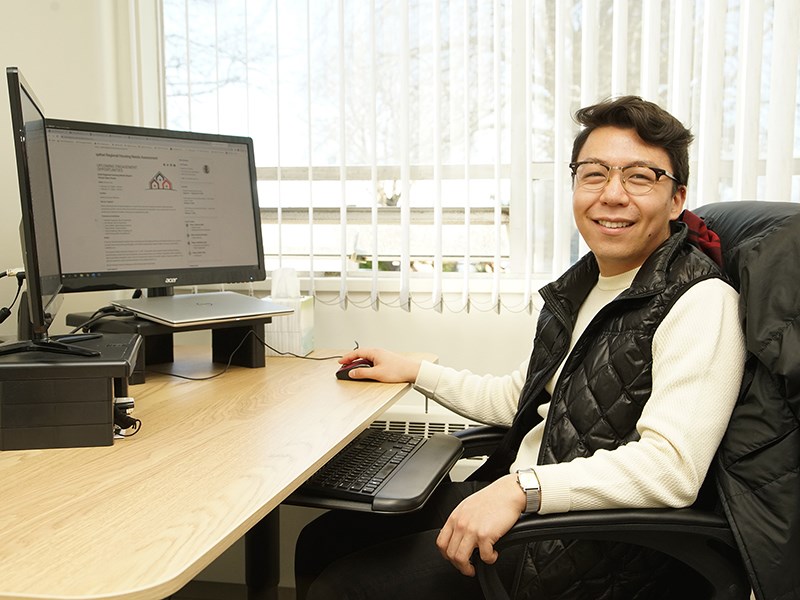City of Powell River Council will consider applying for a grant to support homelessness initiatives during COVID-19.
At the March 30 committee of the whole meeting, regional social planner Kai Okazaki provided an overview of the grant program that would help address homelessness in the region.
The grant, administered by Union of BC Municipalities (UBCM), is called strengthening communities’ services. Okazaki said this program specifically supports the unsheltered, homeless population and addresses community-related impacts.
“The fund is made available to help temporarily bridge the period of COVID-19 outbreaks and to look at post COVID-19 recovery,” said Okazaki. He added that the purpose of his report to the committee is to consider a recommendation to apply for this grant.
Okazaki said the grant is available for local governments and treaty first nations to look at intended outcomes to improve health and safety of unsheltered people living in public or private spaces, and to help reduce any community concerns about public health and safety where these people may be seeking temporary shelters or services.
“We did see this housing continuum from the housing needs assessment report and the primary purpose of this fund is to look at that left-hand side towards the shelters and transitional supportive pieces, as they all play an important role for the different stages of housing,” said Okazaki.
Planner highlights initiatives
He said progress has been made over the years with several initiatives in this region and wanted to highlight some of the more recent initiatives coming from non-profit organizations and as well, partnerships with governments.
In 2019, there were temporary winter shelter beds made available through BC Housing’s emergency shelter program and Lift Community Services. In the same year, the 44-unit supportive housing complex on Joyce Avenue opened and that created permanent housing units, through Lift and Lifecycle Housing Society, which are the operators.
There are nine units ongoing in a transition house, through Powell River and Region Transition House Society. The facility provides a wraparound 24-hour a day shelter for up to 30 days, particularly for women and children facing violence.
Okazaki said the housing hope program provides financial support for youth younger than 19 and families with children who are at risk of homelessness, which is provided through Powell River Educational Services Society.
He said there are other varying levels of social services from other non-profits, provincial ministries and other agencies.
“All of these initiatives play a key important role of social support that achieves the overall goal of housing those in need,” said Okazaki.
He added that the region does not have a designated facility to activate any emergency shelter program.
“Finding a space in the past has been a challenge with these types of programs whenever they are necessary,” said Okazaki. “Each year, they have been housed or located at different facilities or locations. The most recent was the former Lutheran church.”
Complex at capacity
In terms of existing facilities, the Joyce Avenue supportive housing complex is at capacity and it has been identified that an additional 15 to 20 individuals could benefit from that type of supportive housing service, said Okazaki. Lifecycle Housing Society identified a wait list of 150 people in 2020, he added, for the affordable rental housing stock.
In terms of the provincial grant, Okazaki said city staff identified two areas that might create the most impact. The first is looking to facilitate temporary structures on city-owned properties, and increasing capacity for public health and safety among existing departments and partnering organizations.
“If all of these programs are in place and we still have members experiencing inadequate housing, or being unsheltered, this is a way municipalities can really take leadership in utilizing their own properties to facilitate those kinds of temporary natures of these homes,” said Okazaki.
He said transitional housing units have been set up on city-owned property in places such as Duncan and Victoria. He said it’s a temporary solution while longer-term supportive housing is planned.
UBCM can contribute up to 100 per cent funding for programs Okazaki outlined. He said if the city, Tla’amin Nation and qathet Regional District wanted to go forward with applications, up to $1.1 million can be contributed to this kind of initiative.
Councillor George Doubt said he thinks this is a tremendous need.
“The idea of finding an appropriate system of temporary shelter for the immediate future is important,” said Doubt. “I like the idea of the temporary housing and the fact it can work together with supportive housing and the other rental opportunities we are hoping will come. We have to get moving quickly or we will find ourselves in a situation like many other municipalities with people camping. This will get them under a roof. It’s a good idea and I support it.”
The committee gave consent to send it to city council’s April 15 meeting.




